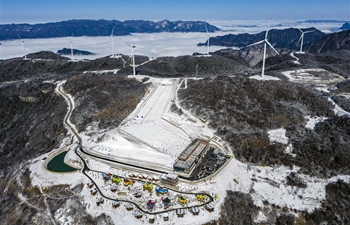BERLIN, Jan. 15 (Xinhua) -- Germany's economy grew by 0.6 percent in 2019 and the country registered the slowest real gross domestic product (GDP) growth in six years, the Federal Statistical Office (Destatis) said on Wednesday.
Germany's economy has been affected by two different "economic trends," Destatis noted. While the services sector and the construction industry registered high growth rates, the country's important industry has seen an "economic slump."
At the same time, German consumers continued to support the overall economy and increased their expenditures by 1.6 percent year-on-year, according to Destatis.
The German Ministry for Economic Affairs and Energy said that private consumer spending remained a "reliable pillar of the domestic economy." Consumer spending was profiting from a high employment level as well as a marked increase in disposable incomes, according to the ministry.
For the first time, the total workforce in Germany in 2019 exceeded 45 million people, roughly 400,000 more than in 2018. This increase was mainly due to a rise in employment subject to social insurance, Destatis said.
The output of Germany's industry, which accounts for more than a quarter of the total German economy, was down 3.6 percent year-on-year. According to Destatis, the main contributor to this decrease was the low output of the automotive industry.
"The local automotive industry is in a recession," said Claus Michelsen, chief economist of the German Institute for Economic Research (DIW), adding that the associated economic sectors "were also affected by this weakness."
"Weak demand on international sales markets has fully impacted the German industry," stressed Michelsen. Generally, exports had "suffered for a long time from the numerous unresolved political issues," such as Brexit or the trade dispute between the United States and China.
German exports continued to increase in 2019, but at a slower pace than in the previous years, growing 0.9 percent in price-adjusted terms. Price-adjusted imports increased by 1.9 percent but also below the previous year's level of 3.6 percent.
"The uncertainty in trade remains," said Nicola Brandt of the Organization for Economic Co-operation and Development (OECD) in Berlin, and warned that this could "spill over" to Germany's domestic economy. "The big question" is how long Germany's economy would continue to "bear the brunt."
Since the global financial crisis in 2009, when GDP dropped by 5.7 percent, Germany's gross domestic product has been growing continuously. Apart from two weaker years, real GDP grew at an annual average rate of 1.3 percent between 2008 and 2018, according to Destatis.
Despite the slower economic growth, Germany still generated a federal budget surplus of 49.8 billion euros (55.51 billion U.S. dollars) for the sixth time in a row, Destatis said.
"Germany has a good chance of escaping this downturn with a black eye," commented Sebastian Dullien, head of the Macroeconomic Policy Institute (IMK).
"The German economy is likely to have bottomed out by the end of 2019 and there are indications that economic growth will gradually accelerate again in the course of 2020," Dullien said.
German economic institutes like the Kiel Institute for the World Economy (IfW Kiel) and the Munich-based ifo Institute expect gross domestic product to grow 1.1 percent in 2020 and 1.5 percent in 2021.













